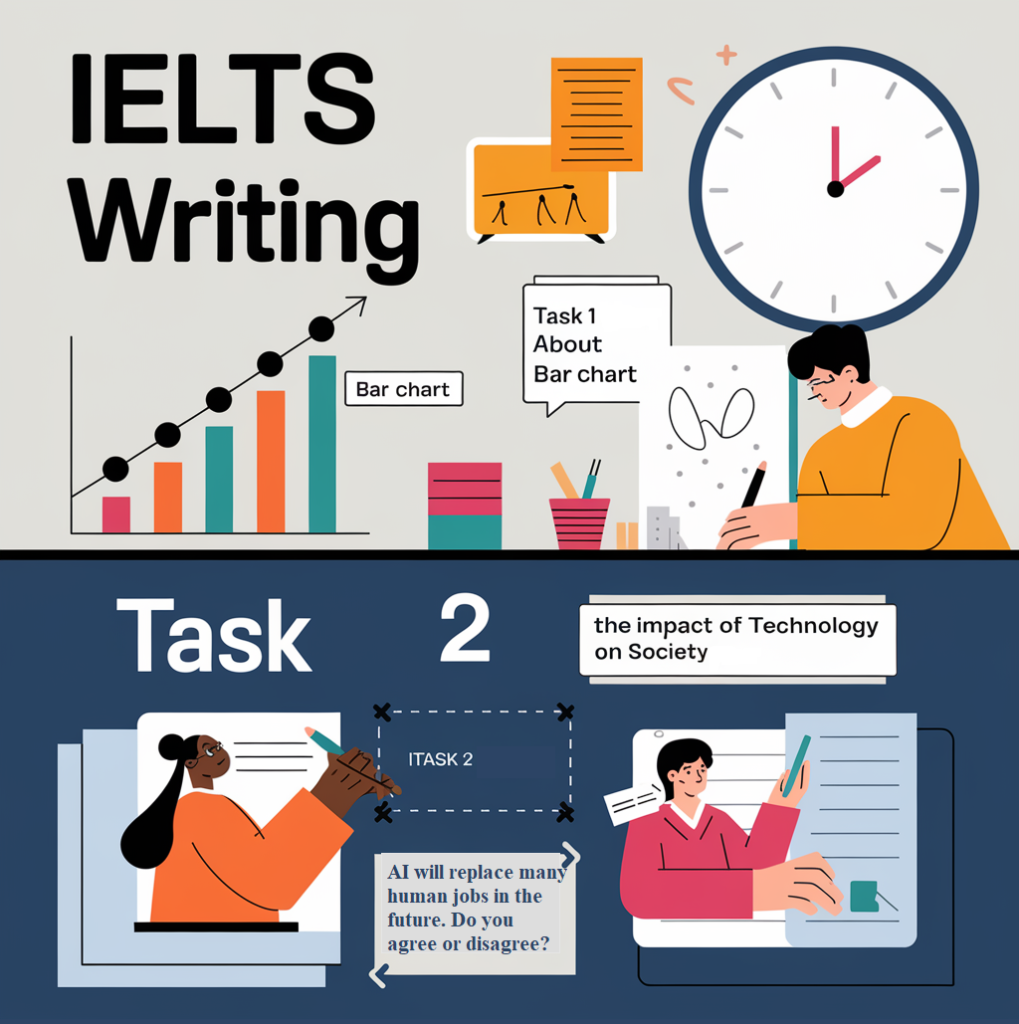Feeling overwhelmed by the IELTS writing section? You’re not alone! Many test-takers find it challenging due to the need for strong English proficiency, structured organization, and clear expression.
However, you can boost your confidence and improve your score by understanding the exam’s requirements and applying proven strategies, such as effective planning, vocabulary enhancement, and structured writing. With the right approach, you can refine your writing skills, avoid common mistakes, and maximize your performance on exam day.
What is the IELTS Writing test?
IELTS Writing Test Breakdown
Task 1 – Academic vs. General Training
- Academic IELTS: Test-takers analyze and summarize visual data (graphs, charts, tables, or diagrams) using clear, factual descriptions.
- General Training IELTS: Candidates write a letter (formal, semi-formal, or informal) to request information or address a situation.
Task 2 – Essay Writing
Both modules require candidates to write a structured essay on a given topic. This involves:
- Presenting a clear argument
- Supporting ideas with evidence
- Using a wide range of vocabulary
Scoring & Assessment
The Writing test is graded on four key criteria:
- Task Achievement/Response (how well the question is addressed)
- Coherence & Cohesion (logical organization and flow)
- Lexical Resource (variety and accuracy of vocabulary)
- Grammatical Range & Accuracy (sentence structure and correctness)
Both tasks are equally weighted, with scores ranging from 0 to 9. The test lasts 60 minutes under strict examination conditions.

Tips to Improve Your IELTS Writing Score
Achieving a high score on the IELTS Writing test requires a strategic approach, strong writing skills, and familiarity with the exam format. Below are expert tips to help you maximize your performance and enhance your writing abilities.
1. Understand the IELTS Writing Tasks
The IELTS Writing test consists of two tasks:
- Task 1 (Academic Module): Requires test-takers to describe, summarize, or explain a graph, table, chart, or diagram.
- Task 1 (General Training Module): Involves writing a letter, which can be formal, semi-formal, or informal.
- Task 2 (Both Modules): Writing an essay responding to a question or argument. This task carries more weight in scoring.
Understanding the expectations of each task is crucial for achieving a high band score.
2. IELTS Sample Questions and Practice
Regular practice helps you refine your writing speed and accuracy. Try writing essays under exam conditions and analyze high-scoring responses.
Practice Prompt
“Some people believe the government should provide free healthcare, while others argue individuals should be responsible for their own medical costs. Discuss both views and give your opinion.”
Practice Task: Write a 250-word response and compare it with band 8+ sample answers from IELTS official sources.
3. Improve Your Writing Structure
A well-organized essay is key to scoring high. Follow this structure for Task 2 essays:
- Introduction: Briefly introduce the topic and present your thesis statement.
- Body Paragraph 1: Discuss the first viewpoint with supporting examples.
- Body Paragraph 2: Discuss the second viewpoint with supporting examples.
- Conclusion: Summarize key points and state your final opinion.
Use transition words (e.g., “on the other hand,” “furthermore,” “consequently”) to improve coherence and cohesion.
4. Expand Your Vocabulary and Grammar
Using a range of vocabulary and sentence structures will boost your writing score. Avoid repeating words; instead, use synonyms and advanced phrases.
Example:
Instead of “important,” use crucial, vital, significant, or essential.
Additionally, master different sentence structures:
- Simple: “Technology is changing our lives.”
- Compound: “Technology is changing our lives, and it plays a crucial role in communication.”
- Complex: “As technology evolves, it significantly influences the way people interact.”
5. Seek Feedback and Improve
- Have a teacher or tutor review your essays for constructive feedback.
- Join IELTS writing forums to compare responses with other test-takers.
- Self-evaluate using official IELTS band descriptors.
6. Overcome Test Anxiety
- Practice under timed conditions to simulate exam pressure.
- Use deep breathing techniques to stay calm before writing.
- Focus on the task at hand rather than worrying about the outcome.
7. Edit and Proofread Your Work
Before submitting your test, take a few minutes to review:
- Grammar & punctuation errors
- Word choice & clarity
- Task completion & coherence
Common Error Example
Incorrect: “I have a dream to become a successful businesswoman.” Correct: “I dream of becoming a successful businesswoman.”
Final Thoughts
These expert tips can improve your IELTS Writing score and make you feel more confident on exam day. Consistent practice, structured writing, and attention to assessment criteria will help you achieve a high band score.
For more Resources, visit the following sites,
Start practicing today and aim for your target IELTS score.









 Evan John
Evan John